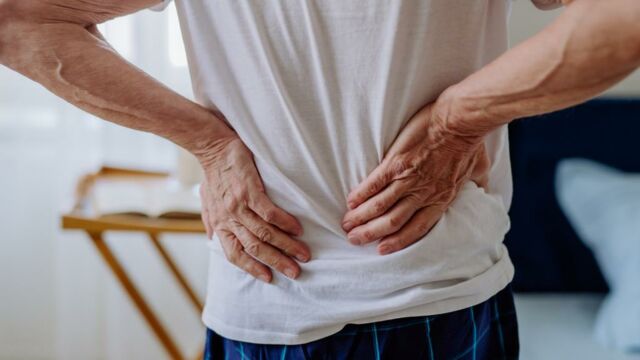It's necessary for us to be mindful of, and listen to the cues our body gives us about our health. Even something as simple as watery eyes could be an indication of serious medical issues.
Discover our latest podcast
With back pain being something many adults routinely experience, it could end up being ignored by many as routine. However, back pain can happen for a range of reasons: it could be linked to your kidney or sometimes even sneezing can cause back pain. Sometimes, back pain can even strike at odd moments, such as after eating.
As reported by Health Digest, here are some of the reasons why you could be experiencing back pain after eating.
Gastrointestinal pain
Even though back pain is generally not associated with indigestion or stomach problems, gastrointestinal issues can cause back pain. If you experience ache in your upper and middle back after eating, as stated by Health Digest, it is most likely caused due to three stomach-related issues:
- Gastroesophageal reflux disease (GERD) occurswhen stomach acid repeatedly flows back into the tube connecting your mouth and stomach (esophagus). The chest pain and heart burn felt with GERD can radiate to shoulder blades, lower back, and down into your abdomen.
- Peptic ulcers are open sores or raw area in the lining of the stomach or intestine. Abdominal pain is one of the main symptoms of these ulcers. Back pain, though an atypical symptom, may occur as the abdominal pain radiates to the back.
- Or gallbladder issues, such as gallstones stones can lead to a blockage or inflammation, causing you to feel stomach pain on the right side, along with nausea, and indigestion. The pain from gallstones is generally experienced as gnawing and felt in the upper right or centre of your belly, your lower back, or between your shoulder blades.

Read more:
⋙ Back pain: 4 Pilates moves to help relieve back pain
⋙ Are you late all the time? It could be a sign of this mental health condition, according to doctors
Food allergies or intolerances
Consuming food or drinks you are allergic or intolerant to, commonly causes issues such as rashes, stomach ache, or even anaphylaxis in very serious food allergy cases.
However, eating food your body is intolerant to, can also be the cause of your back pain. These foods can cause inflammation in the body, specifically in your back and joints. For example, studies have suggested an association between eating gluten and back pain. Also, foods such as dairy or wheat could be causing you to experience back pain.
If you notice any such adverse reactions for certain foods, be sure to consult your doctor.
Kidney infections
If your kidneys happen to be infected by bacteria, it can also result in you experiencing a range of issues such as indigestion, stomach ache, and lower back pain. A kidney infection will also show symptoms such as fever, fatigue and discomfort or pain during urination. Most kidney infection can be easily addressed with antibiotics prescribed by a doctor.
Poor posture
If the back pain you feel after eating is located more on your upper back, the report suggests that it could be a result of poor posture.
If if sit slumped for long hours in a position where your neck is pushed forward from your shoulders, you can end up having what's commonly called 'tech neck.' This posture is very common for people who spend hours on the desk looking at a computer or scrolling phones. It can have long-term health repercussions.
Similar posture while eating can trigger the same ache. Sitting this way can cause pain that starts from your neck, and leads all the way down to your shoulders and upper back.
Read more:
⋙ Here's why your teeth sometimes hurt when you chew
Sources used:
Health Digest: ' Why You're Experiencing Back Pain After Eating'















